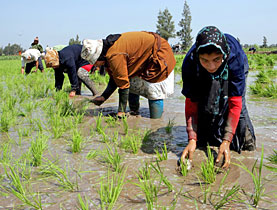Promises and mixed feelings mark food summit

The 181 countries at a United Nations summit have pledged to fix the global food crisis, but the meeting's final outcome has left anti-poverty campaigners dismayed.
After three days of debate, delegates at the Food and Agriculture Organization (FAO) in Rome approved a declaration resolving to ease the suffering caused by soaring food prices and step up investment in agriculture.
“We firmly resolve to use all means to alleviate the suffering caused by the current crisis, to stimulate food production and to increase investment in agriculture, to address obstacles to food access and to use the planet’s resources,” the conference’s final pronouncement read.
Swiss non-governmental organisations on Friday sharply criticised the result of the three-day meeting.
“The motto of the FAO, ‘Fiat panis’ – let there be bread – given the meagre outcome of the conference, is a mockery of the millions of hungry people,” said Rosmarie Bär of Alliance Sud, the Swiss Alliance of Development Organisations.
“The reasons and relationships that have lead to this crisis are known and recognised by governments,” the Alliance Sud said in a statement. “But that alone does not help the hungry.”
Mixed feelings
Manfred Bötsch, the director of the Swiss Federal Agriculture Office and a conference delegate, said he expected the Rome resolutions would eventually be implemented but expressed disappointment in the meeting’s failure to issue a strong mandate on biofuels and ecological issues.
“I’m confident that one day we will [implement solutions],” he told swissinfo. “As usual, it takes time. And around biofuels, I think there is no way out – we need to establish multilateral indicators and assessments for this sector, to come up with clear message that such products are produced in ecological and socially sound environments.”
The Swiss Farmers’ Association said the final resolution was “missing the urgently needed change in agricultural policy”. It has warned of further concentration of power in international agriculture markets.
“What we’re missing completely are any comments as to the question of speculation,” Bötsch said. “There are just no answers there.” He added the delegates had also failed to concretely address issues of small-scale agriculture in developing countries.
Commodities speculation and increased consumption of meat and dairy goods by populations in burgeoning Asian countries are considered among the primary factors in the food price hikes. Rising fuel prices drive up costs of fertilizers, farm vehicle use and transport of food to market.
Asian governments have been restricting rice exports, a practice blamed in part for the high prices of the staple commodity. Japan, whose heavily-subsidised farmers already produce enough to fulfil domestic demand, nevertheless stores some two million metric tons of rice, much of which is imported from its Asian neighbours and the United States.
Impact
Rome’s agreement will have to be quickly integrated into farm and trade policies in 181 countries to have any sort of impact on some 850 million undernourished people in the world, a number rapidly increasing, according to UN officials.
UN Secretary-General Ban Ki-moon had told the summit that import taxes and export restrictions must also be minimized to alleviate hunger, and the declaration called for “reducing trade barriers and market-distorting policies”.
“We took the measure of the problem of hunger in the world correctly,” added FAO head Jacques Diouf.
Officials narrowly avoided embarrassing failure when Latin Americans – food exporter Argentina in particular – protested at the final declaration’s criticism of export curbs, instituted by some countries in an attempt to protect against inflation.
Latin American allies Cuba, which criticised the United States embargo on the socialist state, and Venezuela, which argued that developing countries needed to be able to shield their markets from free trade, joined in.
Observers said that much of the 12-hour rancour over the final resolution was characterised less by discussion of food than by politicking.
“It’s quite normal that at the first time you talk about such a huge and demanding topic, that 180 countries are not just coming up with a common understanding,” Bötsch said. “It always overlaps and is guided by political topics and interests that have actually nothing to do with the topics that are discussed.
“Therefore, it is, rather normal that countries take time to come up with common measures and a common understanding,” he added.
The Rome debate on the potential benefit to poor farmers of new global trade rules will feed into a push to conclude the Doha round of World Trade Organisation talks.
swissinfo, Justin Häne
In the past year, wheat prices have risen 130%, soybean 87% and corn 31%, according to the Bloomberg news agency.
The Food and Agricultural Organization of the UN says the price of rice has gone up 70% over the same period.
There have been food riots and protests in Burkina Faso, Cameroon, Egypt, Ethiopia, Haiti, Indonesia, Ivory Coast, Niger and the Philippines.
In 2007, corn-based ethanol fuel and its impact on tortilla prices caused tens of thousands to take to the streets in Mexico City.
The world population has grown from 2.5 billion in 1950 to 6.1 billion in 2000 and is projected to reach 9.2 billion by 2050.
The UN says as much as $20 billion (SFr20.8) may be needed each year to increase food production to combat hunger.
Four years ago, $10-15 billion was invested in agricultural commodities funds – now that figure is more than $150 billion.
The Unesco-IHE Institute for Water Education in 2003 reported on water use in the production of each kilogram of food.
Beef:
16,000 litres
Cheese:
5,000-5,500 litres
Grain:
1,000-2,000 litres

In compliance with the JTI standards
More: SWI swissinfo.ch certified by the Journalism Trust Initiative



You can find an overview of ongoing debates with our journalists here . Please join us!
If you want to start a conversation about a topic raised in this article or want to report factual errors, email us at english@swissinfo.ch.